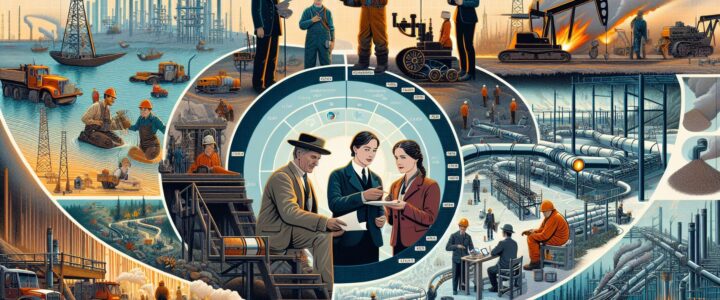The oil and gas industry has played a pivotal role in shaping the Canadian economy for decades. This sector is known for its unique blend of resource extraction, technological advancements, and environmental concerns. However, amidst all these challenges and opportunities, there is one particular subject that often goes unnoticed – the unconventional rise of the oil and gas industry in Canada. In this article, we will delve into the intricate details surrounding this subject and explore the perplexing trajectory that has taken it to unprecedented heights.
Over the past few years, Canada has emerged as a major player in the global oil and gas industry. With vast reserves of unconventional resources such as oil sands and shale gas, the country has managed to tap into this immense potential. What makes this rise truly remarkable is the unconventional nature of the resources being exploited.
The extraction of oil sands, for instance, involves the utilization of unconventional techniques such as steam-assisted gravity drainage (SAGD) and mining. These methods, combined with technological advancements, have enabled Canada to become the world’s third-largest producer of oil. This newfound success, however, has not come without its fair share of controversies.
Environmental concerns have long plagued the oil and gas industry, and Canada is no exception. Critics argue that the extraction and processing of unconventional resources pose significant risks to ecosystems and contribute to climate change. Despite these challenges, the industry has made significant strides in minimizing its environmental footprint.
Technological innovations have played a crucial role in ensuring sustainable development within the sector. From advancements in carbon capture and storage (CCS) to the implementation of stringent regulations, the oil and gas industry in Canada is committed to mitigating its impact on the environment.
Moreover, the rise of the oil and gas industry in Canada has also brought about economic benefits. The sector has created numerous job opportunities and contributed significantly to the country’s GDP. Additionally, investments in infrastructure development and research and development have further strengthened the industry’s position domestically and globally.
However, it is important to note that the unconventional rise of the oil and gas industry in Canada is not without its fair share of challenges. Fluctuating oil prices, regulatory uncertainties, and geopolitical factors can all impact the sector’s stability. Nevertheless, industry players are constantly adapting to changing circumstances and embracing innovation to ensure their long-term success.
In conclusion, the unconventional rise of the oil and gas industry in Canada has been a subject of both fascination and perplexity. With its vast reserves of unconventional resources, the country has managed to establish itself as a global player. However, the industry’s success has not come without its fair share of environmental and economic challenges. Through technological advancements and sustainable practices, the industry is working towards minimizing its environmental footprint and ensuring long-term viability. As Canada continues to navigate the complexities of this sector, it is crucial to strike a balance between economic growth and environmental stewardship.

